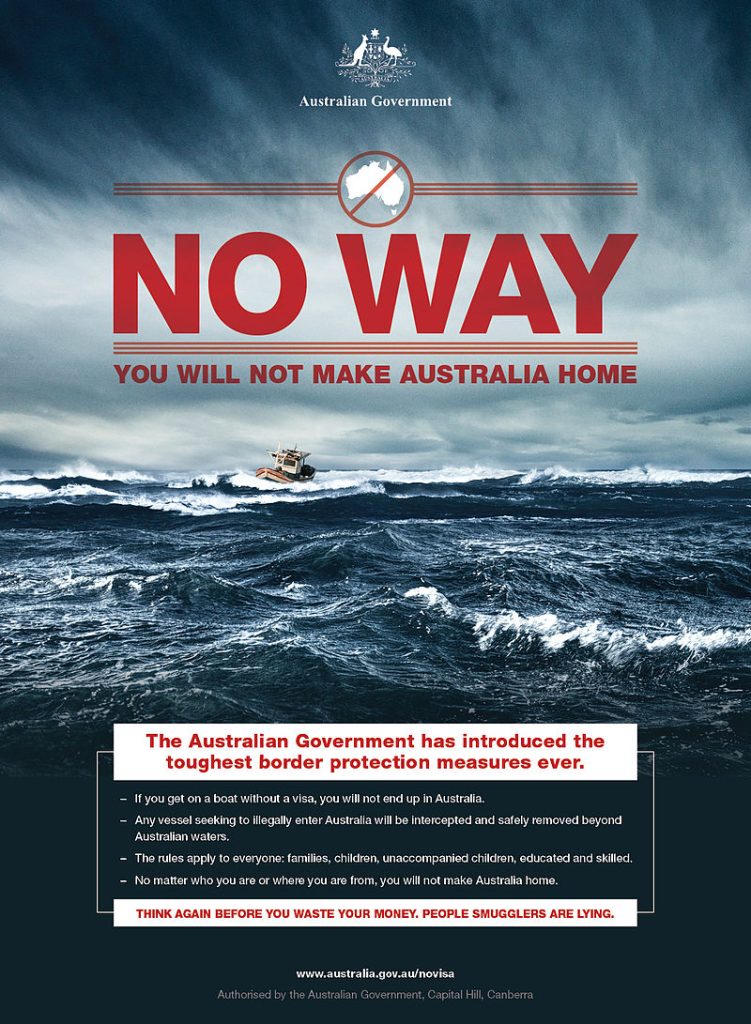By Juan Zhang.
On 19th March, 2023, British Home Secretary Suella Braverman caused yet another controversy during her two-day visit to Kigali, Rwanda, with a photo of her laughing at the building site of future housing intended for asylum seekers to be deported from the UK to Rwanda. This visit drew new criticism from both mainstream and social media, which continued to challenge the Rwanda deportation scheme and the associated Illegal Migration Bill that could potentially violate both the Refugee Convention and the European Convention on Human Rights.

This controversial deportation scheme, seen as the Conservative government’s ‘vanity project’, faced strong public condemnation and resistance since it was first announced in April 2022. Observers at the time already pointed out the uncanny similarities between the UK-Rwanda deal and the Australian ‘stop the boats’ policy with its infamous offshore processing scheme. It seems that Australia’s past mistakes and systematic failures at ‘stopping the boats’ for at least two decades offer no deterrence to the UK to pick up the same playbook, when the UK Home Office takes Australia’s harsh zero-tolerance approach as an example of achievement instead of a hard lesson to be learned (see Gleeson 2021, Tubakovic, Murray and Matera 2023).
The Australian offshore asylum programme, introduced in 2001 as the ‘Pacific Solution’ to unauthorised immigration by the Howard Coalition government, targeted people entering Australian waters via ocean crossings and arriving by boat. This programme was closed in 2007 by the Labour government (under Kevin Rudd), but revived again in 2012 as ‘Pacific Solution Mark II’ with a hard-line approach to ‘stop the boats’ (see Bakshi 2020 for a full account). The suffering and inhumanity found in Australia’s offshore detention programme caused worldwide concern and criticism on how Australia ‘privileged migration deterrence goals over human rights considerations’, and how it deliberately normalised ‘moral disengagement from the pain and suffering of people in detention’ for populist political gains (see Barnes 2022). It is therefore bewildering to see such a notorious policy, known for being ‘cruel, costly and ineffective’ for 20 years (Gleeson and Yacoub 2021), now being embraced by the UK government as inspiration for how to manage asylum seekers. The Melbourne-based organisation Asylum Seeker Resource Centre (ASRC) expressed a profound sense of concern to the Australian broadcaster SBS:
‘It’s appalling that, despite a decade of cruelty that has led to severe harm, death, compensation pay-outs by the government, third-country deals, medical transfers, and international notoriety, the Australian model has influenced global policy.’
There are already extensive reports and analysis that question whether the UK can actually ‘stop the boats’ with its adapted Australian model (for example, Gleeson 2021, Koser 2022). Apart from the legal obstacles the UK has to deal with, different political as well as geographical contexts also suggest that the Rwanda deportation plan is unlikely to proceed smoothly or result in the same kind of outcome as seen in Australia. Moreover, the ‘Rwanda Solution’ – if we can call it that – provokes deeper concerns over legacies of imperialism, colonialism and entrenching patterns of global inequalities. It is effectively outsourcing border control in a way that perpetuates forced displacement, instituting a form of structural violence that holds life in a ‘permanent state of injury outside any realms of protection and political intelligibility’ (Phipps and Yohannes 2022). The Rwanda scheme has already caused toxic social and political divisions both within the UK and beyond before any individual could be sent on a deportation flight. But the government remains determined despite challenges coming from all fronts. Braverman’s Rwanda tour at this moment seems particularly tone deaf to the wider public debate demanding a compassionate and more ethical process with regard to unauthorised Channel crossing.
Whether the UK manages to ‘stop the boats’ when (and if) the Rwanda scheme is in full play remains to be seen. But this much is clear – the number of people crossing the English Channel on small boats has continued to increase in 2022, despite stern messages that the UK will ‘detain and deport you’. These boat arrivals are played up in the current corrosive narratives on the UK’s state of emergency caused by migrant illegality and compromised border security. The Rwanda solution, then, seems very much like a production of ‘xenophobic spectacle’ (Koram 2022) that distracts the public from deeper problems and crises at home. Braverman seems optimistic that, with this visit, the deportation flights between the UK and Rwanda will take off by summer 2023, when legal loopholes and courtroom battles are finally settled. By then, the public is led to believe, all problems with the small boats will magically disappear. But this short-term, single-minded agenda on deportation and offshore processing creates nothing more than a tunnel vision approach that Australia has tried and failed. What gives the UK government the conviction that the Rwanda solution will deliver a better result?
Juan Zhang is a Senior Lecturer in the Department of Anthropology and Archaeology at the University of Bristol. Her research explores borders and transnational migration with particular interest in Asian borderlands, migrant im/mobilities and transnationalism, cross-border cultural politics and China. She is the co-ordinator of the MMB research challenge, Bodies, Things, Capital.
For more information about the 2023 Illegal Migration Bill see the list of resources on our webpage.

